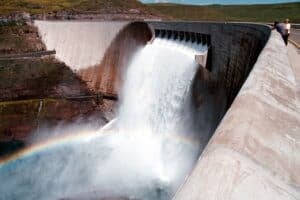South Africa faces a severe water crisis that is affecting human rights and leading to high infant mortality, says experts.

As the country’s water supply reaches the point of collapse, the absence of access to safe running water and proper sanitation infrastructure marks the potential downfall of a functioning society.
Water resources scientist Carin Bosman said issues of clean water supply were countrywide, reflecting a systemic problem in all municipalities.
According to Bosman, the lack of clean water provision had resulted in high infant mortality rates.
“In Limpopo we see children still having a ‘bucket festival’ and kids are dying,” she said.
“If one looked at what we normally use as a yardstick to determine if water service provision is up to standard or not – in terms of the infant death rate in the country (this being how many kids die before they reach the age of five and what the causes are), we find in almost all our provinces that the highest cause of infant death rate is diarrhoeal diseases.
“It is gastroenteritis which has only one cause … and that is poor water services.”
Bosman said employees of the water works were well trained in most cases, and they tried their level best to operate these facilities well.
But “the problem lies in matters like procurement”.
She cited an example of a water plant employee who submitted a request for chlorine to disinfect water, but it was not supplied for nine months.
“We need to do an entire re-education and retraining of every single person, it does not matter where they work in a municipality, to make them aware that what they do, even if it’s just to sign a purchase order, affects human lives and affects human rights.”
Bosman said the country should rethink the system where politicians at the municipal level make decisions on where budgets are allocated, but “who do not necessarily always act in the best interest of the people”.
“We should consider something like regional services councils or district services councils, where there is no political interference in terms of how money is spent and where people are held responsible and accountable.
“The lack of accountability currently implies more people’s lives are placed at risk.”
The South African Human Rights Commission (SAHRC) recently released a report which found KwaZulu-Natal municipalities and water service authorities were violating residents’ right to access clean drinking water.
The SAHRC conducted a five-day inquiry into access to water in KZN last year from 15 to 19 August as they had received more than 600 complaints about water issues since 2020.
Water resource specialist Prof Dennis Ocholla noted that capacity in the municipalities was weak and typically service delivery was hampered by shortcuts.
He called for a drive to bring back retired engineers to municipalities.
“Catchment management forums no longer operate and therefore there are no structures to deal with issues at the grassroots level,” Ocholla added.
Support Local Journalism
Add The Citizen as a Preferred Source on Google and follow us on Google News to see more of our trusted reporting in Google News and Top Stories.








